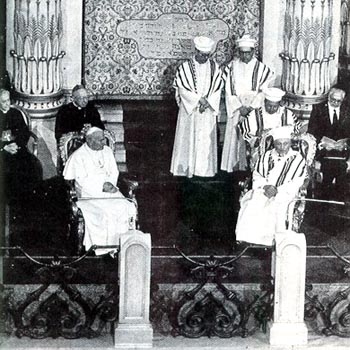 |
Ecumenism
Rabbi Sherwin Said...
Atila Sinke Guimarães
Published in The Remnant, September 17, 1999
In an article in Maryknoll Magazine (March 1999), I read about the book John Paul II and Interreligious Dialogue (Orbis Books, 1999), written by Rabbi Byron Sherwin and the Jewish writer Harold Kasimov. The book is supported by a forward of Edward Cardinal Cassidy, President of the Pontifical Council for Christian Unity. The article features excerpts from Rabbi Sherwin, whose testimony is worthy of consideration when he speaks about the advantages the Jewish religion has gained from John Paul II.
I will present his words, and add some commentaries.
 
A symbolic gesture: John Paul II was the first Pontiff to visit a synagogue, that is, the synagogue of Rome in 1986 |
• “In his many journeys, the ‘traveling Pope’ has made a point of meeting with representatives of local Jewish communities wherever there is one, even not large.”
• “He is the first Pontiff to visit a synagogue, that is, the synagogue of Rome in 1986.”
• “In 1993, he personally interceded in the Auschwitz convent controversy – which had become a grating obstacle to the stability of Catholic-Jewish relations – by ordering the convent’s nuns to relocate.”
• “In April 1994, he hosted a concert at the Vatican in memory of the victims of the Holocaust, and later that year, through his direct influence, the Holy See established full diplomatic relations with the State of Israel.”
These are some of the facts reported by Rabbi Sherwin. Indisputably the Jewish religion has much for which to thank John Paul II. The same cannot be said with regard to the millennial tradition of the Church, which always distinguished between acts of charity that Popes made to Jews and the categorical repudiation of the false Jewish religion.
However, the book deals with more than just these attitudes. The author also touches on doctrine. For example, he makes this comment on the conciliar Declaration regarding relations with Jews:
“The teachings of Nostra aetate regarding Judaism and Jewish people proclaimed a doctrinal change of direction from the past. Judaism is no longer viewed by the Church as a religion obsolete in the first century, but rather a ‘living heritage’ rooted in the past and vibrantly alive in the present. It is with the living and contemporary Jewish people – heirs to an irrevocable and enduring covenant - that the Church enters into fraternal dialogue.”
If the rabbi is right in attributing such intentions to John Paul II, and the book’s preface by Cardinal Cassidy suggests an approbation of the Holy See for the opinions of the author, we would have Judaism being considered as the “heir to an irrevocable and enduring covenant.” In other words it signifies that all the condemnations of the Church against the errors of Judaism would be wrong and that this religion should be considered as a model for Catholics.
Such consequences become even clearer in Sherwin’s commentary:
“The Christian covenant is now seen not as replacing but as continuing and amplifying the covenant made with Israel. Consequently, theological anti-Semitism [that is, to be opposed to the errors of the Jewish religion] rather than being integral to Christian teachings become anathema to it. The Pope’s theological perspective, recognizing the permanence of the covenant with Israel, leads not only to a recognition of the theological integrity of Judaism, but also to the integration of the covenant with Jews into the process of Christian self-identity. …. Christian identity has now become irrevocably and integrally related to an encounter with Judaism.”
A strong statement! After Nostra aetate and according to the theological perspective of John Paul II, Catholics would only find their own identity to the measure that they recognize the “integrity” of the Jewish religion. Once again, Judaism should be taken as a model.
This would be one of the doctrinal fruits plucked from the new theological perspective that John Paul II, based on Vatican II, gave to the Jewish question. And there are many others…

|

Related Article of Interest
 Curiousities from the Orthodox Arena Curiousities from the Orthodox Arena

Ecumenism | Hot Topics | Home | Books | CDs | Search | Contact Us | Donate

© 2002-
Tradition in Action, Inc. All Rights Reserved
|
 |
|